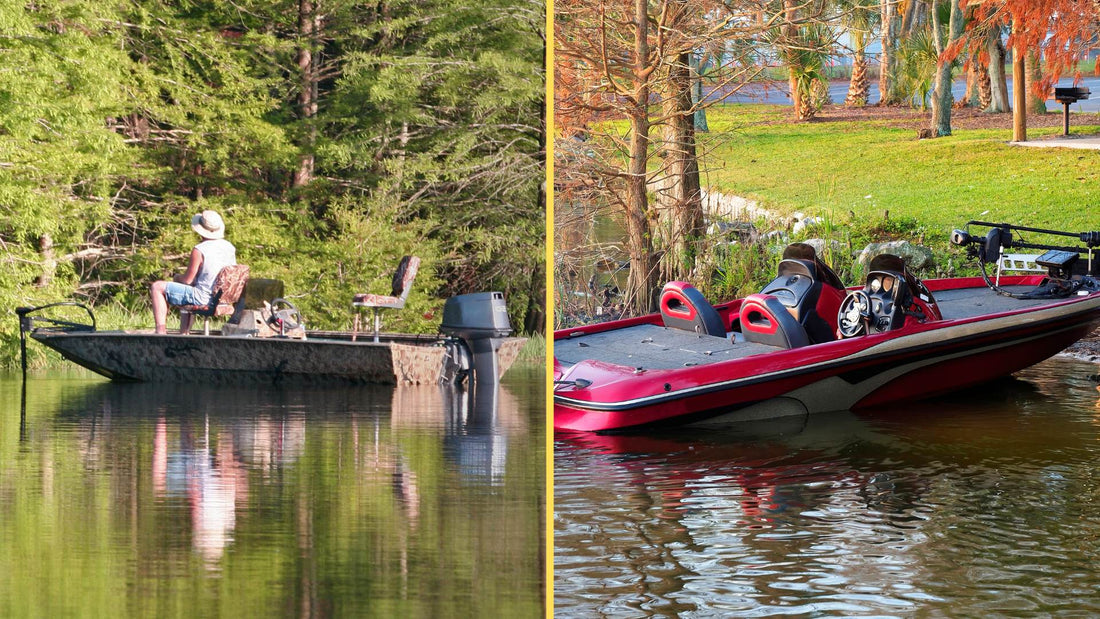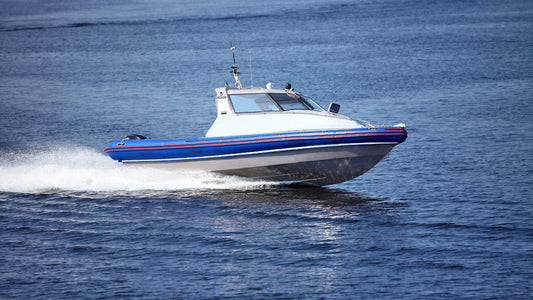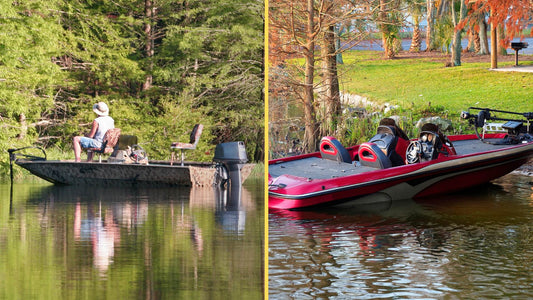
Aluminum vs. Fiberglass Bass Boats – Pros and Cons: Which is Best for You?
Nicholas HeislerShare
Choosing between an aluminum and a fiberglass bass boat is one of the most crucial decisions an angler can make. Both materials have their advantages and drawbacks, affecting performance, cost, durability, and overall experience. Whether you are a seasoned tournament angler or a weekend fishing enthusiast, understanding the differences will help you select the right boat for your needs.
In this comprehensive guide, we will break down the pros and cons of aluminum and fiberglass bass boats, comparing ride quality, maintenance, durability, cost, and performance to help you make an informed decision.
Overview of Aluminum Bass Boats
Construction and Design
Aluminum bass boats are typically welded or riveted using aluminum sheets, making them lightweight and durable. The hull designs have evolved significantly, with modern aluminum boats now offering wider beams for improved stability.
Advantages of Aluminum Bass Boats
One of the key benefits of aluminum boats is their durability. Aluminum is naturally resistant to impact damage, making it ideal for navigating shallow waters, rocky shorelines, and stump-filled lakes. Unlike fiberglass, aluminum does not crack or chip upon impact.
Another advantage is the lightweight nature of aluminum boats, which makes them easier to tow, even with a smaller vehicle. The reduced weight also means they require a smaller engine, which often leads to better fuel efficiency.
Aluminum boats tend to be more affordable compared to fiberglass models. They have a lower initial purchase price, and their maintenance costs are generally lower due to fewer cosmetic concerns and reduced susceptibility to damage.
They also require less maintenance. Unlike fiberglass, aluminum does not require waxing or gel coat maintenance. It is less prone to scratches and does not fade as quickly in the sun.
Disadvantages of Aluminum Bass Boats
One of the biggest downsides of aluminum boats is their rougher ride in choppy water. Due to their lighter weight, aluminum boats do not handle rough water as smoothly as fiberglass boats. The hull design of aluminum boats is often less sophisticated, leading to a bouncier ride in waves.
Aluminum boats also tend to be noisier on the water. Water hitting an aluminum hull creates more noise, potentially scaring away fish. Fiberglass boats provide a much quieter fishing experience.
In terms of customization, aluminum boats often lack built-in features like spacious storage compartments, rod lockers, and high-end electronics that come standard in fiberglass models.
Overview of Fiberglass Bass Boats
Construction and Design
Fiberglass boats are molded from fiberglass-reinforced plastic, allowing for sleek, aerodynamic designs. The smooth finish and sculpted hulls provide an edge in performance and aesthetics.
Advantages of Fiberglass Bass Boats
One of the most significant advantages of fiberglass boats is their stability and ride comfort. The heavier weight of fiberglass boats allows them to cut through waves effortlessly, providing a stable and comfortable ride, even in rough water conditions.
Fiberglass boats also offer better performance and maneuverability. Their hydrodynamic hull design allows for better speed and control. They accelerate quickly and handle turns more smoothly, making them a favorite for competitive anglers.
Another major advantage of fiberglass boats is their customization options. They often include built-in storage, livewells, and high-end electronics. More options are available for deck layout, trolling motor placement, and seating configurations.
Fiberglass boats also have an aesthetically pleasing appearance and tend to hold their resale value better over time. Their glossy, polished finish gives them a sleek and professional look.
Disadvantages of Fiberglass Bass Boats
One of the primary disadvantages of fiberglass boats is their higher cost. They are significantly more expensive than aluminum boats, both in terms of purchase price and maintenance.
Fiberglass boats are also much heavier, requiring a larger engine, which increases fuel consumption. The added weight also makes them more difficult to tow, meaning a stronger vehicle may be necessary.
Maintenance is another concern. The gel coat finish on fiberglass boats requires regular waxing to prevent oxidation and fading. Fiberglass is also more prone to cracks and chips, which can be costly to repair.
Fiberglass vs. Aluminum Bass Boats: At-a-Glance Comparison
Aluminum Bass Boats
- PRO - Durable construction: Resists dents and dings; ideal for shallow or rocky water
- PRO - Lightweight: Easier to tow with smaller vehicles and needs less horsepower
- PRO - Fuel efficient: Smaller engine = lower fuel consumption
- PRO - Lower cost: More affordable upfront and easier to maintain
- PRO - Minimal maintenance: No waxing or gel coat required; less sun fading
- CON - Rougher ride: Bouncier in choppy water due to lighter weight
- CON - Noisier on the water: Aluminum hull transmits more sound
- CON - Limited features: Fewer built-in storage and electronic options
Fiberglass Bass Boats
- PRO - Smooth, stable ride: Heavier hull cuts through waves for comfort in rough water
- PRO - Superior performance: Faster acceleration, tighter handling, and better control
- PRO - High customization: Offers built-in storage, electronics, and flexible layouts
- PRO - Sleek appearance: Glossy finish with higher visual appeal
- PRO - Better resale value: Holds market value over time
- CON - Higher cost: More expensive to purchase and maintain
- CON - Heavier to tow: Requires more powerful engine and vehicle
- CON - More maintenance: Needs waxing; prone to cracks and gel coat damage
Performance Comparison
Ride Quality:
- Aluminum boats: Lighter and less advanced hull design = rougher ride in choppy water
- Fiberglass boats: Heavier and hydrodynamic = smoother, more stable ride in all conditions
Speed & Maneuverability:
- Aluminum boats: Adequate performance, but less refined handling
- Fiberglass boats: Faster acceleration and smoother turns due to superior hull design
Durability:
- Aluminum boats: More impact-resistant; better for rocky or shallow waters
- Fiberglass boats: Vulnerable to cracks and chips on impact
Noise Levels:
- Aluminum boats: Noisier—water slaps against the metal hull
- Fiberglass boats: Quieter ride, ideal for stealth and fishing
Customization & Features:
- Aluminum boats: Basic layouts with fewer built-in amenities
- Fiberglass boats: More integrated storage, seating, and electronics
Maintenance and Longevity
Aluminum boats require less maintenance than fiberglass boats. They are resistant to dings, scratches, and fading, and they do not require frequent waxing. However, they can be susceptible to corrosion, particularly in saltwater environments.
Fiberglass boats, while more visually appealing, require regular upkeep. Owners need to wax the gel coat to maintain its appearance, and any cracks or chips need to be repaired to prevent further damage. However, fiberglass boats tend to hold their value better over time.
Cost Considerations
Aluminum boats are generally more affordable, with entry-level models starting around fifteen to thirty thousand dollars. Fiberglass boats, in contrast, typically start at thirty thousand dollars or more, with high-end models exceeding seventy-five thousand dollars.
In terms of long-term costs, aluminum boats have lower maintenance costs and better fuel efficiency due to their lighter weight. Fiberglass boats, while requiring more upkeep and expensive repairs, tend to retain their resale value better.
Making the Right Choice: Aluminum vs Fiberglass
Ultimately, the best choice between an aluminum and a fiberglass bass boat comes down to your personal priorities, fishing style, and budget. If you value affordability, ease of towing, and durability in rough terrain or shallow waters, an aluminum boat may be the practical choice. On the other hand, if you’re looking for superior ride comfort, advanced features, and a sleeker aesthetic—especially for competitive angling—a fiberglass boat may be worth the investment. By weighing the pros and cons of each, you can choose the boat that best supports your time on the water and delivers the fishing experience you’re after.
When it comes to keeping your fishing boat clean, look to Captains Preferred Products' boat cleaners and chemicals. Find everything you need to keep your vessel squeaky clean all season - always at the best prices.




